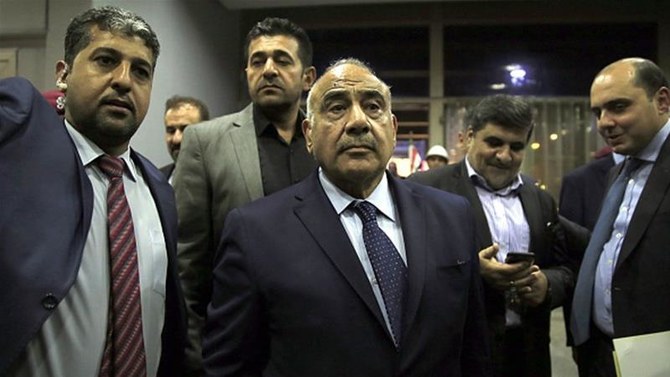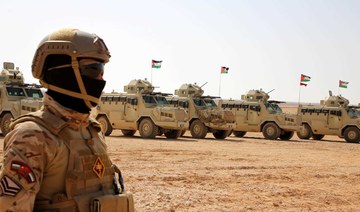BAGHDAD: Political factions in Iraq are waging a secret battle to gain control of thousands of key government and agency jobs in a bid to tighten their grip on power and exert as much political influence as possible, according to lawmakers and analysts.
About 5,000 high-profile positions, including heads of independent government agencies, deputy ministers, heads of universities, deans, ambassadors, diplomats, and commanders of military divisions and security services, are supposed to be filled by nominees who will act independently of political parties.
However, until now they have been filled mostly by proxies of the leading parties, primarily the Islamic Dawa Party, which “was representing the main structure of the deep state built by former prime ministers,” lawmakers said.
There is growing concern that far from dismantling the “deep state,” the latest appointees will simply replace it with another that is even stronger.
Under the 2019 annual budget law, all the posts must be filled by the end of June. Prime Minister Adel Abdul Mahdi has to send a list of nominees to Parliament by then for approval.The political party or parliamentary bloc that controls these positions will effectively dominate the Iraqi state for the next 10 to 15 years, because the access they provide to the departments they represent will help to serve the personal agendas of any leader, analysts said.
“These posts are not political and they are much more important for the political parties than the ministries, so they are ready to sacrifice anything to get a share of them,” Rahman Al-Joubori, a researcher at the Center for Regional Studies at the American University in Sulaimaniyah, told Arab News.
“Each of the parties has strategically planned to get this department or that department as compensation for the ministries that they gave up, and because some of them are eyeing the same departments or trying to get more than their share, disputes have erupted.”
Iraqi political groups have adopted a power-sharing system since the 2003 US-led invasion that toppled Saddam Hussein. Each party is supposed to receive a share of the available positions proportional to the number of seats it holds in Parliament. They can submit candidates to fill these posts regardless of the required professional standards or qualification.
The Islamic Dawa Party, which has led four of the six governments in power during the past 16 years, has controlled most of the most important positions and organizations by appointing its followers to run them by proxy, bypassing Parliament and preventing rivals from getting their share.
Former Prime Minister Nouri Al-Maliki, who led two of the four Dawa governments, frustrated his political rivals, including his successor Haider Abadi, by controlling the acting directors of the most important, or advanced, jobs, especially those related to security and inspections.
“The Dawa party, represented by Al-Maliki, created the deep state and rooted it in the Iraqi state after 2006 by taking over most of the advanced positions,” a prominent Shiite leader involved in the current talks to allocate these positions told Arab News.
“In addition to the human and financial resources provided by these positions, it is an effective tool to terminate opponents, control the core of the state, and destabilize its economy and security whenever it is needed.”
The General Secretariat of the Council of Ministers, which is responsible for submitting candidates to fill the positions, formed a committee to allocate the jobs two months ago. Its members include the secretary-general of the Cabinet, the director of the prime minister’s office, and representatives of the most prominent Shiite, Sunni and Kurdish political forces in the government and Parliament. The commission has been meeting almost daily, but nominees have been agreed for only a few dozen positions, according to the prime minister’s press office.
The disputes between the political factions began on the first day the committee met. Some members demanded positions with levels of importance incommensurate with the number of seats they hold, while others sought control of organizations that are of particular interest to their powerful blocs. These include Saeiroon, the political wing of Muqtada Al-Sadr, the influential Shiite cleric; and the pro-Iranian Fatah alliance, which includes the Badr Organization, one of the most powerful Shiite armed factions, and Assaib Ahl Al-Haq, the second-most powerful Shiite armed faction.
Disagreements about the levels of the positions and the heads of independent agencies took a new turn when many committee members began to publicly complain.
Ammar Al-Hakim, leader of Al-Hikma and a prominent ally of Al-Sadr within the Reform parliamentary coalition, last week announced he was withdrawing from the coalition and joining the opposition in protest at the way the committee was distributing the jobs, and “the lack of access to the posts that he has been looking for.”
He was soon followed by another Al-Sadr ally, Haider Al-Abadi, whose Al-Nassir party also announced it would join the opposition because it refused the “quest (by some political parties) to form a new deep state, greater and deeper than the old one.”
“The coalition of Al-Nassir is backing (the efforts) to end the file of special grades as soon as possible, but must be resolved, in accordance with professionalism and efficiency standards, away from the parties,” Al-Nassir member Ali Al-Sineed said on Monday. “There are parties that want to control the special grades in order to create a new deep state, which (will be) deeper than the current one.”
Although Al-Sadr has publicly warned members of his bloc against “rooting the old deep state or building a new one,” and threatened to abandon them if they insist on a share of the positions, the committee still holds daily meetings in the presence of representatives of Saeiroon.
Hamad Al-Rikabi, a spokesman for Saeiroon, said on Monday that members of the political bloc are following Al-Sadr’s instructions to refrain from seeking any of the positions and work on “dismantling the deep state.”
Badr, Al-Nassir, Al-Hikma and Assaib all issued statements last week confirming that they would not seek any special-grade or high-profile jobs to which they are not entitled based on power-sharing agreements. However, behind the scenes, all are still negotiating to grab a share of the positions, government sources said.
“All of them say that they are not seeking to get a share, but actually they are fighting to get them,” said an adviser to Abdul Mahdi.
“Saieroon, Assaib and Badr are at the forefront of other blocs that are working to get as many of these posts as they can. They say that they are working to dismantle the deep state of Al-Maliki by stripping the Dawa party of all the positions that have been under its control for 14 years , but the truth is that they will just replace it.
“They promised to nominate independents who had nothing to do with them, but that does not mean the nominees are not fully subservient to them.”


























